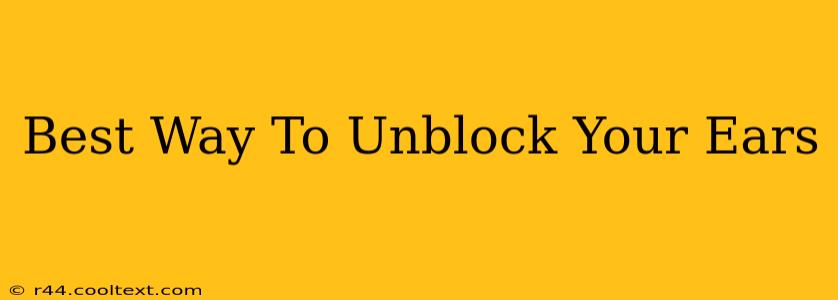Feeling that annoying pressure or fullness in your ears? That plugged-up sensation can be incredibly frustrating, interfering with your daily life and even causing pain. Fortunately, there are several safe and effective ways to unblock your ears, and this guide will walk you through the best methods. We'll cover everything from simple home remedies to when you should seek professional help.
Understanding Why Your Ears Get Blocked
Before diving into solutions, let's briefly understand why your ears might become blocked. Several factors can contribute:
- Earwax Buildup: Excessive earwax can impede the natural drainage of the ear canal, leading to a feeling of fullness or muffled hearing.
- Changes in Altitude: Rapid changes in altitude, such as during air travel, can create pressure imbalances in the middle ear, resulting in a blocked sensation.
- Sinus Infections: Inflammation and congestion in the sinuses can affect the Eustachian tubes, which connect the middle ear to the back of the throat, causing blockage.
- Fluid Buildup: Fluid accumulation in the middle ear, often due to allergies or infections, can also lead to ear blockage.
- Swimmer's Ear: This outer ear infection can cause swelling and inflammation, blocking the ear canal.
Simple and Effective Ways to Unblock Your Ears at Home
Many ear blockage issues can be resolved with simple home remedies. Here are some of the most effective:
1. The Valsalva Maneuver:
This technique involves gently trying to equalize pressure in your ears. How to do it: Pinch your nostrils closed, close your mouth, and gently blow air out of your nose as if you were trying to inflate a balloon. You should feel a slight popping sensation as your ears unblock. Important Note: Avoid forceful blowing, as this can cause further damage.
2. Yawning:
Yawning naturally equalizes pressure in the ears. Try to yawn widely and deeply. This can often alleviate mild ear blockages.
3. Swallowing:
Similar to yawning, swallowing can help to open the Eustachian tubes. Try swallowing repeatedly while gently massaging the area around your ears.
4. Warm Compress:
Applying a warm compress to the affected ear can help to soothe any inflammation and may promote drainage. Use a clean washcloth soaked in warm (not hot!) water.
5. Over-the-Counter (OTC) Saline Nasal Spray or Drops:
These can help to clear congestion in the nasal passages, which can often contribute to ear blockage. Follow the directions on the packaging.
When to See a Doctor
While home remedies are effective for many, some situations require professional medical attention:
- Severe pain: Intense ear pain accompanied by blockage warrants immediate medical attention.
- Hearing loss: Noticeable hearing loss alongside ear blockage should be evaluated by a doctor.
- Discharge: Any pus or drainage from the ear necessitates a doctor's visit.
- Persistent blockage: If home remedies fail to provide relief after a few days, consult a doctor.
- Vertigo or dizziness: These symptoms alongside ear blockage can indicate a more serious condition.
Preventing Ear Blockage
Preventing ear blockage is often easier than treating it. Here are some helpful tips:
- Avoid excessive earwax cleaning: Don't use cotton swabs or other objects to clean deep inside your ear canal, as this can push wax further in and cause impaction.
- Stay hydrated: Drinking plenty of fluids helps thin mucus and promotes drainage.
- Treat allergies and sinus infections promptly: Address underlying conditions that can contribute to ear blockage.
- Use earplugs during air travel: This can help prevent pressure changes from affecting your ears.
By understanding the causes and employing these simple strategies, you can effectively manage and alleviate ear blockages, ensuring clearer hearing and a more comfortable experience. Remember to always consult a doctor if you experience persistent or severe symptoms.

